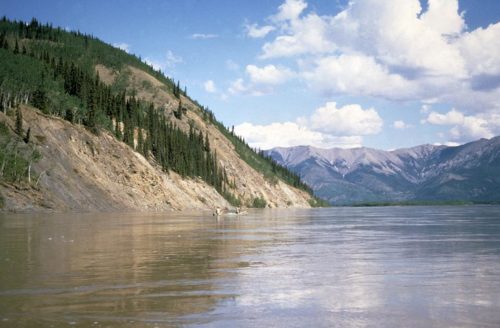
State, Canadian Interests Team Up To Plan Restoration Of Yukon River Chinook Stocks
The following press release is courtesy of the Alaska Department of Fish and Game:

Alaska Fish and Game and Fisheries and Oceans Canada Sign Agreement Concerning Recovery of Yukon Chinook.
April 01, 2024 (Juneau) – The Alaska Department of Fish and Game (ADF&G) and the Fisheries and Oceans Canada (DFO) signed an agreement regarding the recovery of Chinook salmon in the Yukon River drainage. The agreement is focused on rebuilding these stocks to a level that they can once again provide for subsistence, as well as sport, commercial, and personal use fishing opportunities.
Using a novel approach, the agreement implements a suspension of directed Chinook salmon commercial, sport, domestic, and personal use fisheries in the mainstem Yukon River and Canadian tributaries for one full life cycle (seven years). ADF&G Commissioner Doug Vincent- Lang said, “After hearing from people living along the river, it is time to look beyond single year management. This agreement looks to rebuild over a life cycle of the chinook salmon, 7 years.”
Recognizing the importance of Chinook salmon for ceremonial use and the transmission of cultural knowledge, the agreement allows Alaska and Canada, at their discretion, to provide limited harvest opportunity for these purposes during the rebuilding period. Senior Director Steve Gotch of DFO said, “During the period of rebuilding we must take measures to preserve the culture and traditions of people living along the river. This agreement allows both Alaska and Canada to accommodate a limited harvest for ceremonial purposes to occur in accordance with local traditional practices.”
The agreement also calls for Alaska to minimize incidental harvest of Chinook salmon in all other mainstem Yukon River fisheries over this seven-year period. ADF&G Commissioner Doug Vincent-Lang said, “Over the past few years Alaska has developed selective harvest methods to minimize the incidental harvest of chinook salmon while providing opportunities to harvest other species such as chum salmon. While we understand these selective harvest methods are constraining, we believe it is in the best interest of Alaskans to rebuild our shared Chinook salmon stocks.”
The agreement places a priority on traditional and local ecological knowledge research on the health of Yukon River Chinook salmon to better understand the causes of low run abundances and to identify possible solutions.
It also directs the Yukon Panel, a group of stakeholders that live along the river, to develop a recovery plan to guide recovery of the stocks. Senior Director Steve Gotch of DFO noted “The people living along the Yukon River are best poised to help develop the principles and objectives within the recovery plan. Traditional knowledge and western science will guide the path forward”.
Finally, the agreement calls for further efforts to address long-term cumulative effects of other factors, particularly habitat degradation resulting from resource and hydroelectric development, competition from hatchery production, cyclic natural phenomena, and large scale environmental variability affecting both marine and freshwater habitats. Said Vincent- Lang and Gotch, “We must look to what we can do to address cumulative effects on our chinook salmon as we rebuild these stocks. This will require collaboration and new funding.”
A copy of the agreement can be found at



